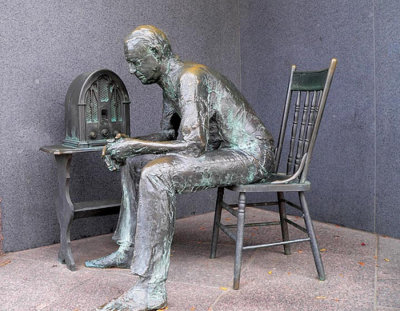Stress vs Depression – Do You Know the Difference?

By: greg westfall
by Andrea M. Darcy
Some stress, caused by regular life challenges, is unavoidable. And while feeling nervous about a work presentation or frustrated by a parent teacher meeting gone wrong is not fun, nobody would compare it to the challenge that is depression.
Severe stress, however, is a different story. As anyone who has suffered chronic stress knows, with the resulting mood swings, sleeplessness, and low of self-esteem it can bring, the line between stress and depression can start to feel a little blurred.
So what is the difference, then?
[Want to know right now which one applies to you? Take our ‘Stressed, Depressed, or Both’ Test now.]
What is Stress?
Stress is the feeling that you are under too much mental or emotional pressure. It is triggered by something in your life happening that feels too much for you personally to handle, regardless of whether others can or can’t. This might be a work issue, dealing with relationship conflict, or debt problems.
Stress isn’t an illness or a disorder, but it can develop into one if it is left to become chronic.
While a little bit of stress is normal and can have positive results like getting you motivated or taking useful risks in the workplace too much stress over too long of a period can begin to negatively affect all parts of your life.
You might find it harder to function and concentrate at work, lose interest in your social life, and find yourself being irritable with those you love. Physically perhaps you aren’t sleeping well, are under or overeating, and have signs of muscle tension including headaches and stomachaches. At worse, it can lead to high blood pressure and other serious health issues.
Stress also affects neurotransmitters and hormones including cortisol that, while it can leave you sometimes ‘buzzed’ in a way that feels good, are taxing on the body and can lead to cycles of feeling high then crashing.
What is Depression?

By: Koshy Koshy
Just like life challenges and chronic stress are different, low moods and depression are not the same beast.
While everyone feels down now and then, depression is a serious issue that involves feeling low for several weeks or longer, even for years in some cases.
It can be triggered by one difficult experience, a build up of things that become too much for you, or, often, seems to just arrive out of the blue with no explanation.
Depression is often based on old, repressed emotions that are making their way to the surface. As such, it rarely responds to logic. You can’t just ‘fix it’, or achieve or finish something that will make it go away. For example, if you moved to a new village and started feeling low, it’s unlikely moving again will completely sort your depression.
Because of its irrationality, depression can often feel out of control. You might feel like you are acting like someone else altogether, unable to connect to people around you.
Depression tends to leave you feeling exhausted, even if you are sleeping (and often depression disrupts good sleep). It can feel like something is draining all your energy and like your head is filled with sand and you can’t think straight.
One if the biggest symptoms of depression is negative thinking, which can spiral into destructive thoughts if support is not sought.
[Want to know more? Read our comprehensive Guide to Depression].
You don’t have to face depression alone. You can get help from a professional, trained therapist from the harleytherapy.com platform, where you can talk to a counsellor anywhere by online or book affordable therapy in person around the UK.
What do Stress and Depression Have in Common?
- both are individual (what triggers stress or depression in one person doesn’t in another)
- they affect your energy levels
- they affect your moods
- sleeping patterns are disturbed
- eating patterns can be disturbed (under or overeating)
- you are ‘not yourself’
- you can struggle to function normally
- and you can be irritable
- you might feel less interested in socialising with friends and family
- they both can feel overwhelming
- you might not be able to concentrate
- both affect the body’s stress response mechanism
- both have been found to affect the brain in similar ways
Stress and depression are also similar in the ways they can be dealt with effectively. While there is no ‘one size fits all’ way for either to improve, or a quick cure, both respond well to treatment. Both, for starters, can be helped by self-care (diet, exercise, balanced lifestyle). Both respond well to talking therapies, and there is increasing evidence that mindfulness is also helpful for sufferers of either or both.

By: Son of Groucho
How are stress and depression different?
stress tends to resolve if life events change vs depression can last up to years
stress tends to have an obvious trigger vs depression can hit out of nowhere
stress is related to life events vs depression can happen even if life seems fine
stress is related to current events vs depression can be linked to unresolved past events
stress can cause depression or anxiety disorders if left untreated vs depression can cause suicidal thoughts if left untreated
stress leads to adrenaline highs followed by crashes vs depression leads to fatigue
stress is socially acceptable and even encouraged vs depression still, sadly, bears social stigma
stress at very high levels has risk of heart attack vs depression at high levels has risk of suicide
low stress can be okay and keep you motivated vs low depression can still be debilitating
The Two Are Related
The reason the line between stress vs depression can seem confusing is that they are related.
For starters, you can be both stressed and depressed at the same time. You can be so stressed your confidence lowers to the extent you are getting depressed, or stressed out because you think you are depressed, or a depressed person who just experienced a difficult event that has left them stressed.
And stress can often actually cause depression. Chronic stress left untreated, can affect your self-esteem as well as lead to negative behaviours and poor decision making, all of which make it hard to feel positive and optimistic. If such symptoms of stress carry on long enough, then depression is sadly a logical outcome.
At the very least stress left unmanaged causes anxiety, and anxiety itself is a leading cause of depression.
[Not sure if you have anxiety or are just stressed? Read our article on stress vs anxiety.]
A case study of stress leading to depression
Let’s look at an example of how stress can careen into full-blown depression. Say someone, we’ll call her Janet, is so stressed by her job promotion she starts putting in extra hours to prove she can handle it. This makes her tired, and she start being snappy with loved ones, feels disconnected from her friends who are able to go out and have fun while she is too stressed, and feels she has no time now to exercise but instead starts overeating as a way to numb her stress.
Her energy levels lower because of her poor self-care. She’s sleeping less as she is worried she isn’t doing well in her new position. She has nobody to confide in as she’s pushed away her support system (which has, by the way, been found to be one of the best buffers against depression). Instead of talking to her manager and explaining she is feeling overwhelmed or hiring a coach to help her, she pushes herself even harder. Low level anxiety begins.
Janet’s self esteem plummets, not helped by the fact her overeating and under exercising has led to her gaining weight, and her bad moods mean her relationship is suffering. She starts to have many negative thoughts. Is she any good at her job? Did anyone really ever like her? Does she even know what she wants from life anymore? She tells herself these thoughts are irrational, but she can’t seem to stop thinking them. Her moods are low now more often than not.
So stress has rolled into a body image issue, low self-esteem, and feeling unloved and lonely. In other words, stress has led to anxiety which has led straight to depression.
But my stress makes me successful…
Life brings stresses that sometimes motivates us. If you are stressed about an exam, or about having to speak on a stage, these are normal kinds of stress that can help you grow as a person and try out new skills and ways of being.
And even bigger stress can sometimes be for the best. If you hate change, but find yourself needing to move house or country, it might be a hard experience but in the long run lead to a life upgrade.
But don’t think your stress is good just because it’s making your money, or because everyone else at work is stressed, or because you think it makes you seem ‘important’. Stress can and does kill, whether through heart attacks or by suicide bought on by stress morphing into depression.
Not sure if your stress is helping or hindering? The secret is to really pay attention to your moods and the thoughts in your head.
- Has your stress given you occasional low moods, are are you feeling low more often than not?
- How long have you been feeling low? Is it two weeks or more?
- Do you feel anxious most of the time? Or is some of your day manageable?
- Can you still come home from the stressful situation and relax?
- Are your thoughts increasingly negative? Do you have thoughts of being hopeless and worthless?
What do I do if my stress is out of control? Or I think I’m depressed?
If you can’t handle your stress levels, seek support. Talking to a good friend is a great starting point. Then consider seeking outside help, whether that is a coach at work, a counsellor, or a psychotherapist.
The thing about stress is that it can cause you to totally lose perspective. Outside help can help you see ways to manage your situation that might never have occurred to you and you might find life can get better faster than you imagined.
If you suspect you are at the phase that your stress has turned into anxiety or depression, counselling or therapy can really be a life saver. It gives you a safe supportive environment to get to the bottom of how your life got out of control and left you feeling the way you do, and helps you learn how to make choices that lead to a life that makes you feel good, not keeps you up at night.
 Andrea M. Darcy is a mental health and wellbeing expert, who has done some training in person-centred counselling and coaching. She advises people on how to plan their therapy journey. Find her on Instagram @am_darcy
Andrea M. Darcy is a mental health and wellbeing expert, who has done some training in person-centred counselling and coaching. She advises people on how to plan their therapy journey. Find her on Instagram @am_darcy







